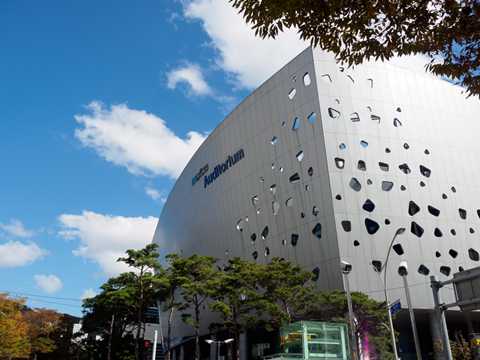
Responding to mounting frustration over slow progress at INC-5 in Busan, Ambassador Luis Vayas Valdivieso is set to release a revised Global Plastics Treaty text ‘as early as noon on Friday’. Now attendees are urging negotiators to act quickly and prioritize completion over consensus.
Halfway through the week (Wednesday 27th November), WWF warned that negotiations to trim down the text and implement the organization’s desired core measures were stalling. It blamed this outcome on a minority of nations and urged policymakers to focus on the ambitions of the majority.
“The mid-week stocktake plenary session brought to light the slow progress we have made so far this week, as well as the urgent need for a decisive shift in negotiations to move away from business as usual to achieve the ambition set in Nairobi in 2022,” said Eirik Lindebjerg, global plastics policy lead at WWF. “The impassioned interventions from a broad range of countries once again shone a spotlight on the need to ensure a handful of countries must not get in the way of that.
“The relentless pursuit of consensus will only result in one outcome: a weak voluntary treaty focused on waste management that would hand down a death sentence to life on this planet and future generations.
“We came here to Busan to get a legally binding treaty with global rules across the entire lifecycle. Member states must now ensure they utilize all procedural options to achieve that outcome, including voting if necessary.
“We are calling out the spoilers on their bluff. All they want is a watered-down treaty. Don’t let them dictate to you what you must do – if this means leaving some uncollaborative countries behind, so be it.”
However, while negotiators and civil society groups believed that the revised text would be released on Saturday, Luis Vayas Valdivieso could now bring every Contact Group’s ideas together and update the treaty ‘as early as noon on Friday’, WWF reports.
Lindebjerg continued: “After days of complaints of agonisingly slow and unproductive discussions in Contact Groups, the Chair is responding to the frustration shown at yesterday’s plenary session where many negotiators made impassioned pleas that they needed to just get on with business in the face of ongoing delaying from spoiler states. And the business at hand is making sure that we leave Busan with a strong treaty that does not compromise on establishing global and binding rules across plastics’ entire lifecycle.
“With less than 24 hours to ensure all core measures are included in the Chair’s text, we urge negotiators to use today’s Contact Groups to push through robust and ambitious measures that are backed by science, and which we need to end plastic pollution. The majority of countries know what these are, and they have already professed their support for such measures – what we want to see from them now is the courage to see their ambition through.”
A similar sentiment was expressed by Inger Andersen, executive director at UNEP: “We’ve now spent nearly two years on this effort, and four-and-a-half meetings. It is high time that we get there.”
Noting a “degree of impatience in the room”, she commended the Contact Groups for “[getting] into action on day one” – but warned that “if we continue at this speed, we will not reach where we need to go”.
She continued: “The UNEA 5/14 resolution is crystal clear – it calls for ending plastic pollution, including in the marine environment; it calls for a life cycle approach, and it references sustainable consumption and production, which everyone knows was agreed language from SDG 12. It also calls, obviously, for a financing mechanism.
“It’s very, very clear that countries want this deal, it’s very clear that the general population wants this deal, and the frustration that we felt in the room is palpable.
“It’s very simple – we have to deliver this treaty by Sunday, and the Contact Groups therefore must move out the sections that they can clear so that they can move on through the plenary to the Legal Drafting Group – if they get stuck, move onto the things they can move on, on. They have to clean that text, and they have to do so expeditiously.
“The Chair has built a big tent in his paper, the non-paper - that is a broad tent, and as I have said before, since not everyone saw themselves or their issues in that tent, it is probably the right tent to start with. It is now the time to get under that big tent.
“We need to see text on the table tomorrow. We ask all members and all participants to focus on reaching that consensus, which we heard from every single participating speaker here in this room just now.
“This treaty can land. It will take goodwill and the desired speed, as I mentioned. But I think we all understand that we want the deal, and if we want the deal, now is the time to move.”
At the start of November, Luis Vayas Valdivieso published his non-paper as a starting point for treaty negotiations at INC-5. WWF was critical of the paper, fearing that it could still allow single parties to veto treaty decisions.
WWF’s own ambitions for the treaty include global bans for the “most harmful” plastic products and chemicals; binding product design and performance requirements and systems; and specific phaseout timelines. Even after the treaty is adopted, it calls for sector-specific criteria for industries that contribute heavily to plastic pollution, including packaging.
For a full overview of the negotiations from INC-1 to INC-4, take a look at our comprehensive guide to INC-5.
If you liked this story, you might also enjoy:
The ultimate guide to the Packaging and Packaging Waste Regulation in 2024
How are the top brands progressing on packaging sustainability?
Sustainable Innovation Report 2024: Current trends and future priorities
Everything you need to know about global plastic sustainability regulation














No comments yet